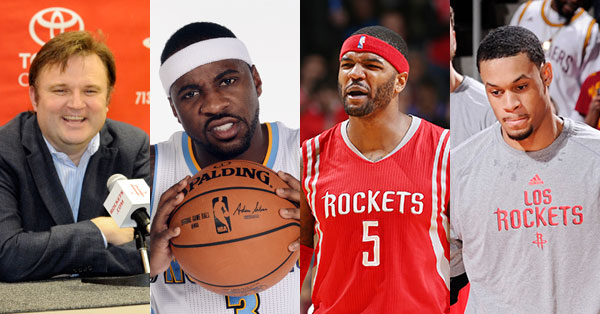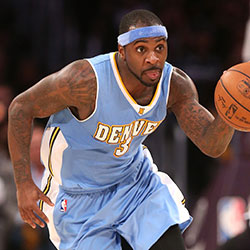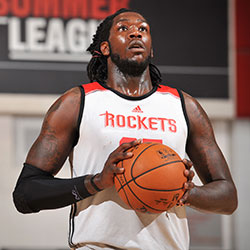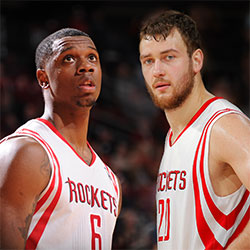Houston Rockets
Houston Rockets Salary Cap Update: 2015 Off-Season Edition
David Weiner breaks down the current salary cap situation for the Houston Rockets after an off-season full of ups and downs,
Published
10 years agoon
It’s been an up-and-down journey thus far for Houston Rockets fans this off-season.
UP: The Rockets pulled in a nice haul in the 2015 NBA Draft, nabbing Wisconsin small forward Sam Dekker with the #18 pick and stealing Louisville power forward Montrezl Harrell with the #32 pick. Mock drafts had Dekker going as high as #8 and rarely lower than #15; and most mocks had Harrell as a sure-fire first round pick.
DOWN: Not long after the draft, word came out that Spanish star point guard (and 2009 second round pick) Sergio Llull had elected not to accept a contract offer from Houston, believed to be for a substantial portion of the Non-Taxpayer Mid-Level Exception (MLE). One of the world’s best players outside the NBA, Llull represented a potential solution to the Rockets’ point guard troubles. But, alas, it was not meant to be this summer. (Note: Llull has since reportedly agreed to a contract extension with Real Madrid that might actually lower his NBA buyout amount for next summer.)
UP: Early in the July Moratorium, the Rockets agreed to terms on new deals with Corey Brewer (three years, $23.4 million) and Patrick Beverley (four years, $23 million). Both signed contracts that decline in salary each year. Brewer’s starting salary is the maximum amount Houston could sign him to with Early Bird rights; and his total contract pays him the exact same amount as Trevor Ariza over the next three years. The fourth year of Beverley’s deal (at just over $5 million) is fully non-guaranteed. Given the contracts that have been handed out this summer, both deals were largely viewed as reasonably good value.
DOWN: On July 4, the league’s premier (departing) free agent, LaMarcus Aldridge, announced that he was joining the San Antonio Spurs, shunning the Rockets’ bid for him. A key reason for the speedy agreements with Brewer and especially Beverley (a restricted free agent) was to prove to Aldridge that Houston would be fielding a competitive roster. It is believed that the Rockets were attempting to acquire Aldridge via sign-and-trade using a package centered around Jason Terry (to be signed-and-traded via his Bird rights), Kostas Papanikolaou (and his non-guaranteed contract) and young players and/or draft picks.
UP: The Rockets added veteran shooting guard Marcus Thornton on a one-year veteran’s minimum deal. While not much of a defender, Thornton is expected to provide much-needed three-point shooting to a team that utilizes the three-point shot more than any other team. He is also capable of the occasional scoring outburst.
DOWN: Seeking a more defined role in advance of hitting free agency again in 2016 (and probably also a little miffed that the Rockets were not willing to use their MLE on him), Josh Smith bolted Houston for the Los Angeles Clippers after endearing himself to Rockets fans during the team’s recent playoff run.
UP: The Rockets agreed to a new deal with restricted free agent K.J. McDaniels (three years, $10 million, using a portion of the MLE). The McDaniels contract includes a team option in Year 3; and by virtue of signing him outright (rather than waiting to match an offer sheet he could have signed elsewhere), the Rockets can trade him without restriction after December 15.
DOWN: Several hours went by following news of the McDaniels signing without the Rockets making another roster move, leaving many fans to be moderately bored for a short period of time. But Houston’s most notable off-season move came later that evening.
UP: Houston pulled off a major trade, acquiring Nuggets star point guard Ty Lawson and a 2017 second round pick in exchange for Papanikolaou, Pablo Prigioni, Joey Dorsey, Nick Johnson, and a lottery-protected 2016 first round pick. In order to make the salaries match in this trade, the Rockets had to renounce their rights to Terry, whose $8.7 million cap hold came off the books, allowing Houston to take back over 150% of its outgoing salary, which is reserved only for teams whose total team salary (including players’ cap holds) does not exceed the luxury tax threshold upon completion of the trade.
The downside risk of acquiring Lawson — who not long ago was arrested for his second DUI this year — was mitigated by several factors. None of the players traded to Denver were in the Rockets’ rotation. The 2016 first rounder immediately converts to a 2017 second rounder (via Portland) if the Rockets somehow miss the playoffs this season. But most notably, Lawson agreed to make the final year of his contract (for over $13.2 million) fully non-guaranteed, essentially making it like a team option for Houston (although, unlike with a “real” team option, the Rockets would not have any Bird rights to Lawson next summer if they waived him). At worst, the Rockets will have wasted a draft pick and some money on a troubled point guard. At best, Lawson can be that second ball-handler and shot creator the Rockets desperately missed in their recent playoff run.
With those ups and downs out of the way (and with more sure to come), it’s time to once again take a look at the team’s salary cap situation and where the Rockets can go from here.
Player Salary, Exceptions and Available Cap Room
The Houston Rockets currently have the following player salary commitments, cap holds and salary cap exceptions available for the 2015-16 season:
Player salary commitments: Dwight Howard ($22.36 million), James Harden ($15.76 million), Lawson (12.4 million), Brewer ($8.23 million), Ariza ($8.19 million), Beverley ($6.49 million), McDaniels ($3.19 million), Terrence Jones ($2.49 million), Donatas Motiejunas ($2.29 million), Dekker ($1.65 million), Clint Capela ($1.24 million) and Thornton ($947,276).
Cap holds: None.
Other Salary Cap Exceptions: Houston has some small trade exceptions from the Alexey Shved ($1.62 million), Isaiah Canaan ($816,482) and Troy Daniels ($816,482) trades.
The Rockets used a portion of the MLE — which can be either the Non-Taxpayer MLE ($5.464 million) or the Taxpayer MLE ($3.376 million) — on McDaniels. If Houston elects to use the Non-Taxpayer MLE (of which they will have about $2.27 million remaining) this season, it will be subject to a hard cap at the “apron” level of $88.74 million.
The maximum team salary (or “soft” salary cap) for 2015-16 came in at $70 million, with the luxury tax threshold coming it at $84.74 million, both numbers a little higher than projected. However, based on their existing salary commitments (totaling over $85.2 million thus far), the Houston Rockets are officially over the luxury tax threshold.
More Moves Coming
With the Rockets already in tax territory, they need to be very careful about their next moves; but with only 12 players under contract, they still need to add to their roster in advance of training camp in a couple of months.
Reports are that Houston has agreed to terms with former Rocket Chuck Hayes on a one-year (partially guaranteed) veteran’s minimum deal to re-join the franchise that gave him his NBA start. Assuming that Hayes makes the roster and is not waived before January 10 (when all NBA contracts become fully guaranteed), Hayes will make nearly $1.5 million this year based on his years of service in the league; however, by signing Hayes to a one-year deal, the Rockets will only have to pay him the two-year veteran’s minimum salary ($947,276, which will also be his cap hit), with the league picking up the tab for everything above that amount. (Thornton is in a similar situation on his one-year deal, getting paid nearly $1.2 million, with only $947,276 of that coming from Houston.)
There are also reports that the Rockets have extended a contract offer to Terry, presumably also a one-year veteran’s minimum deal. While Terry may still be negotiating for a second year on his deal, that concession could be costly to the Rockets, both this season and next. Terry’s minimum salary (like Hayes) is nearly $1.5 million this year; however, for two-year minimum deals, the team is on the hook for the player’s full salary (and the cap hit would match that salary). Signing a two-year deal with Terry would cost the Rockets an extra $1.38 million this season in salary and luxury tax than what they’d pay for a one-year deal, let alone the salary commitment for 2016-17.
Shortly after the draft, it was reported that the Rockets had reached an agreement to sign undrafted free agent Christian Wood to a contract. Presumably, it is a two-year minimum deal with a partial guarantee. Although his rookie minimum salary would be $525,093, for purposes of determining whether the Rockets are over the luxury tax threshold or the apron level, his cap figure will be the two-year veteran’s minimum salary ($947,276).
Because the Rockets are over the luxury tax threshold, each veteran’s minimum signing will cost owner Les Alexander at least an extra $1.42 million in luxury tax (or more, if an older vet is signed to a two-year deal), on top of the player’s actual salary.
The Curious Case of Montrezl Harrell (and the MLE)
Probably the most intriguing roster move may relate to what the Rockets do with Harrell. As a high second round pick, Houston ideally would like to sign him to a three- or four-year deal paying above the minimum salary using the MLE. Some players drafted shortly after Harrell have received some relatively sizable contracts, such as #33 pick Jordan Mickey (four years, $5 million, presumably with over $3 million guaranteed) and #36 pick Rakeem Christmas (four years, $4.3 million, with $3.15 million guaranteed).
Unfortunately, while Houston still has more than enough remaining of the Non-Taxpayer MLE to give Harrell a similar deal, the Rockets are dangerously close to the apron level, where they would be hard-capped if that MLE were used. Assuming that Terry, Hayes and Wood are all added on minimum deals, the Rockets would only have enough space to pay Harrell about $665,000 in Year 1 of an MLE deal without salary being cut elsewhere. This would also limit the Rockets’ ability to add any more salary, even for 10-day contracts and other minimum salary signings. The hard cap is truly a HARD cap.
For these reasons, it seems that the likeliest course of action (barring a trade involving Harrell or otherwise freeing up a meaningful amount of salary) would be to sign Harrell to a one- or two-year rookie minimum deal. However, Harrell does not have to accept a two-year minimum deal if he does not want to. He could instead opt to accept a one-year non-guaranteed contract for the rookie minimum — the required minimum tender for the Rockets to retain his NBA rights — and become a restricted free agent next summer. This was the same strategy used by McDaniels last year with the Philadelphia 76ers, and that strategy clearly paid off for K.J. this summer. But McDaniels had the benefit of assured playing time on a horrendous Sixers team, whereas Harrell will likely be relegated to the D-League for most of this season, with no assurances of NBA playing time on a talent-laden Rockets roster.
With Harrell not being signed to an MLE deal, the Rockets would be free to sign as many minimum contracts as they wish in order to fill out their training camp roster and would be free to make trades taking back additional salary (although they will likely be limited to the 125% matching rules for taxpaying teams). Of course, any additional salary would still be subject to payment of the luxury tax.
To Extend or Not to Extend?
Another key issue on the table for the Rockets this off-season: whether or not to extend the contracts of Jones and/or Motiejunas. Each is eligible for an extension of their rookie contracts, which can be up to four (new) years in length and at up to the maximum salary (based on the new increased salary cap), although odds are that each would get less than that on an extension.
As Bobby Marks wrote about recently, Jones and Motiejunas could be two of the most highly coveted free agents next summer. With the vast majority of teams expected to have copious amounts of cap room, and with the league mandating a minimum team salary at 90% of the new salary cap, teams will be spending like drunken sailors, out of both desire and sheer necessity.
But even with the imminent threat of them being poached in free agency next summer, it is not expected that the Rockets will take the extension route with either player. If allowed to hit free agency, each would have a much lower cap hold than what he would likely get on an extension or in free agency ($6.22 million for Jones; $5.72 million for Motiejunas). Having those lower cap holds gives the Rockets greater flexibility if they want to pursue another star free agent, such as Kevin Durant in 2016, or other avenues for roster improvement. The Spurs recently used this strategy (electing not to sign Kawhi Leonard to an extension last summer) in order to gain the cap flexibility to sign Aldridge this summer.
Don’t be surprised if the Rockets explore trade scenarios for at least one of Jones or Motiejunas, perhaps for a future draft pick or a power forward with more years remaining on his contract. It is unlikely that Houston can afford (or is otherwise inclined) to re-sign both to large new contracts when both play the same position. On the other hand, the Rockets may just as well be inclined to let both play out the year and go with whichever player best distinguishes himself. Or hell, they could re-sign both. There are options galore on that front.
Conclusion
It has been a pretty wild off-season thus far for the Houston Rockets. With the addition of Lawson, they are positioned as a top title contender this season. While the likely inability to lock up Harrell on a longer-term deal is not ideal, it is a small price to pay for avoiding a hard cap and being able to add to the roster and to make in-season moves. And with a roster lined with veterans on reasonable contracts and first round picks on rookie scale deals, the Rockets have plenty of flexibility going forward, whether via trade, free agency or otherwise.
You may like
Houston Rockets
Looking Back on the Trade for Phoenix’s Draft Picks
Are the Rockets set to cash in on Phoenix’s downfall or could a Suns retool murky the waters?
Published
1 month agoon
March 12, 2025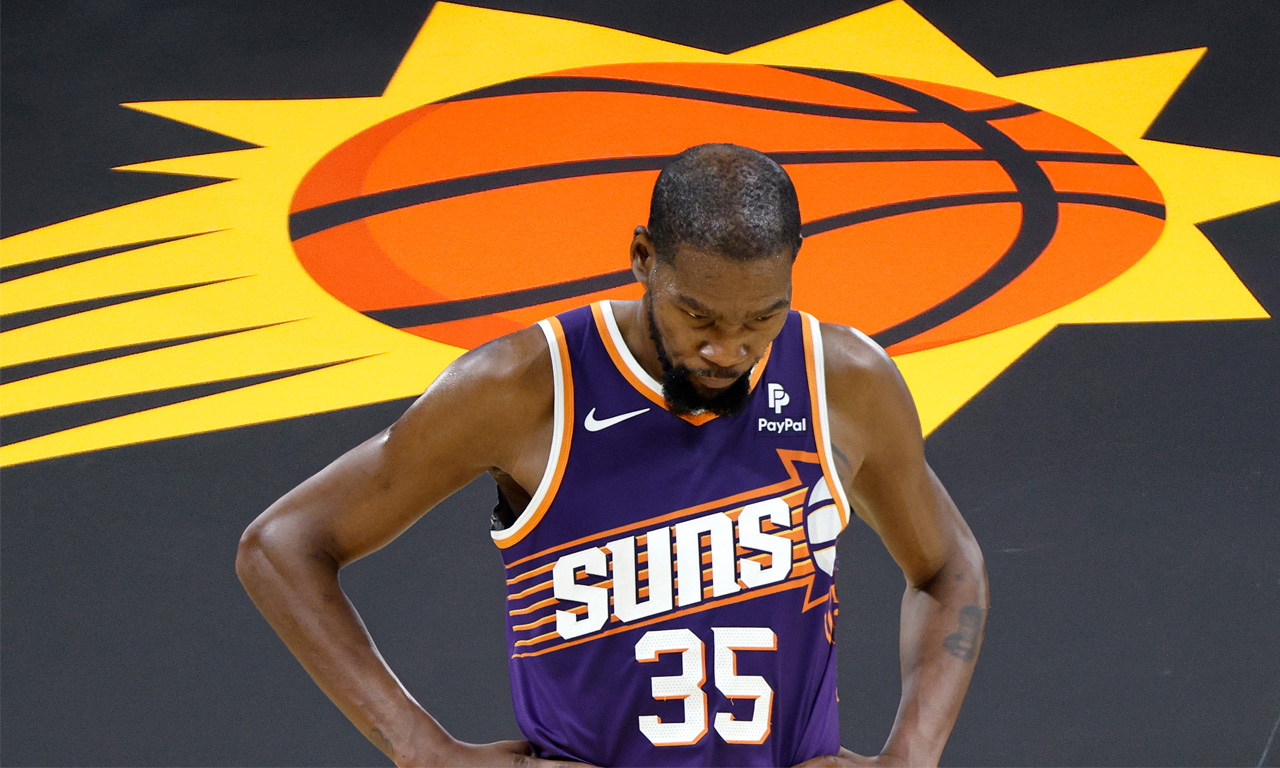
As the Houston Rockets set to host the Phoenix Suns tonight, it seems the right time to take a look back at the trade that linked these two franchises together for the foreseeable future.
This past June, the Rockets made a trade with Brooklyn that sent back to the Nets control of their 2025 and 2026 unprotected first-round picks. In exchange, the Rockets received a large chunk of Phoenix’s future (2025, 2027, 2029) and control of the Dallas Mavericks’ 2029 first.
In essence, the Rockets traded one pick and one swap for two picks and two swaps. All unprotected.
Thoughts At The Time of the Trade
If I’m going to discuss the current outlook of this trade, I have to be honest about how I saw it at the time of the move. While I didn’t hate this trade initially, I definitely didn’t love it either.
I liked that the Rockets increased their overall trade assets. I also liked that they extended the timeline to be able to make a bigger trade and I also appreciated that they kept control of the 2027 Brooklyn swap.
But I didn’t like that the Rockets gave up what seemed like the more established value (Brooklyn) for a more uncertain gamble (Phoenix). The Rockets did not control a “tanking runway” of picks to offer back to Phoenix — all of the picks Houston got in the deal were in staggered years (’25, ’27, ’29). I also felt Brooklyn, who badly needed to rebuild, got away with paying market value to get their picks back despite the fact that the Rockets invested years in watching those picks appreciate up to the point that they had the Nets completely over a barrel.
Net-net: I felt like more certainty was traded for less certainty and it was more of an equitable trade for both teams rather than Brooklyn paying dearly to get back the things only the Rockets could offer.
There were two ways I thought this trade could pay dividends: The Suns needed to flame out immediately, as in this season (unlikely), or the Rockets could trade all those pick assets as part of a deal for a real superstar in the next 12-18 months (more likely).
In a testament to how quickly change can occur in a very unpredictable NBA, four things have happened that have been positive indicators for the Rockets in making this move.
The Suns are fading
While Phoenix had major salary cap issues, dealing with the second apron, they didn’t appear to have problems on the court. They jumped out of the gate 8-1 and looked like a legitimate contender behind their star trio of scorers in Kevin Durant, Devin Booker and Bradley Beal.
Given Houston controlled Phoenix’s pick this year via a swap, it looked like the Rockets would come up empty-handed on the trade this season.
That changed quickly.
Injuries, serious depth concerns and a lack of a defensive identity has sent Phoenix spiraling. Booker’s availability has been inconsistent, forcing Durant to carry the load, while Beal has not quite fit in at all. Their financial limitations, thanks to owner Mat Ishbia’s all-in spending spree, have handcuffed their ability to improve the roster around the three stars.
The Suns are sitting 11th in the West, having gone 22-34 since that hot start, and are currently trying to catch a depleted Dallas squad to get back into the play-in picture.
As of right now, the Rockets project to end up with a lottery pick (albeit a late one) this season out of the trade.
Phoenix was caught shopping Durant
Because the Suns struggled so hard after the start, they tried to make a major move at the deadline but could not unload Beal, in large part due to his no-trade clause.
As a result, they may have made a misstep: They openly tried to trade Durant, which inevitably became public news.
Now? Durant will almost assuredly be traded this summer — likely to a destination that he handpicks. This means the Phoenix Suns will have to look at all possibilities for their future, including potentially having to give Rafael Stone and the Rockets front office a call.
But keep in mind, the Rockets can not offer Phoenix the ability to completely rebuild via the draft right now. Phoenix’s 2026 pick is controlled by Washington. They would have to get extremely creative to set that stage. A retool in Phoenix is much more likely.
Could Brooklyn have been better than expected?
This one is tougher to gauge.
The Brooklyn Nets are currently tied for fifth-worst team in the league, giving them strong lottery odds this summer. This was expected. After all, the Nets, even with a healthy Mikal Bridges and a full roster, were not a good team last season, closing the year 20-41 in the final three quarters of the season. The Rockets ended up with the #3 pick (Reed Sheppard) as a result of Brooklyn’s mediocrity.
However, if the Rockets had not placed that pick back in Brooklyn’s hands, would the Nets be better than this?
Brooklyn brought in a new coach in Jordi Fernandez that has had a positive impact. They have dumped off players, such as Dennis Schroeder and Dorian Finney-Smith, that impacted winning. The bar to make the play-in in the East (.415 winning percentage) is obscenely low, with Brooklyn being just five wins away from it at the moment.
And on top of that, Brooklyn did have lots of draft capital that they could have moved to try to win now.
It’s very tough to say as you don’t know if a team with Bridges still in Brooklyn might have actually been worse than this current squad, but you could make a case that the pick the Rockets would have ended up with from Brooklyn this season would be eerily similar to the one they will end up getting from Phoenix this year.
Again, this is a tough call.
Nico Harrison Hooked the Rockets Up
As part of the trade, the Rockets got control of the Dallas Mavericks’ 2029 first-round pick (unprotected, of course). While there’s really no way of knowing what a pick will be five years out, we did know that Luka Doncic would be just 29-30 years old that season and it was fairly etched in stone that he would be the core piece of a Dallas squad that season.
Enter chaos in Dallas.
Doncic was shipped out in the trade that shocked the world, which could have a major impact on the Rockets. Dallas’ current core of Kyrie Irving and Anthony Davis will be 37 and 36 years old that season, respectively.
On paper, the value of that pick shot up.
Final Summary
Right now, the outlook on these picks looks strong. One source stated off the record that they feel the 2029 Phoenix pick is the best pick asset out there that is owned by another team. The Rockets would be reluctant to add that one specifically into any trade unless it’s for a truly legitimate star.
But if there is any lesson that the NBA teaches us over and over again, it’s that it’s very hard to predict where a team will be a year from now, much less three years from now.
Can the Rockets pressure Phoenix and leverage the ownership they have of their draft capital to get what they really want (Booker) from them? Could a Suns retool around Booker and Beal, with the right pieces and assets acquired from a Durant trade, significantly change their on-court outlook and cap sheet — which in turn could damage the value of the picks Houston controls?
Bottom line is it has worked out well this season, and the future forecast at the moment is promising. The current value of those future picks appears strong. What will likely determine history’s final grade for this trade will be how it sets them up for the trade to come, and that’s where fans will be looking to Stone and the front office for action starting this summer.
Houston Rockets
Amen Thompson’s ankle injury will be re-evaluated in one week
“The things he does you can’t replicate,” says Rockets coach Ime Udoka
Published
2 months agoon
March 10, 2025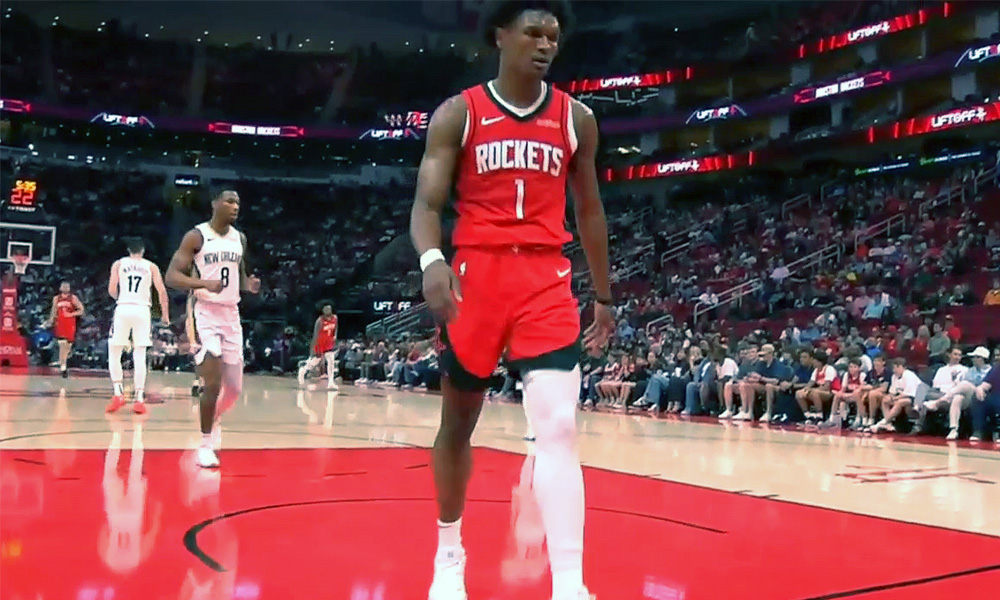
Rockets young star Amen Thompson will have his ankle injury re-evaluated in one week, according to Ime Udoka.
Thompson had an MRI on Sunday and the Rockets coach confirmed all imaging (X-ray, MRI) was negative.
“Just some swelling and pain, obviously,” said Udoka.
If you listen to Udoka, you can tell he knows how special Amen is to this team. He said the Rockets are missing a lot by not having him out there.
“Obviously, the things he does you can’t replicate,” said Udoka. “[Amen is] a guy that plays every position for us. When one goes down, he runs the point. If another is out, he runs the four.”
Amen is one of the best defensive players in the game, and as a one-on-one defender of guards/wings, he might already be the best in the league in just his second season. He’s holding his opponents to 40.5% shooting from the field, tops in the league.
“He’s a very unique defensive player,” said Udoka. “We got some guys that do some great things there, but I like to put him and Dillon on the best two usually, night to night. You got Tari and that’s a luxury as well, but the way he goes about it is different. His athleticism, size, speed, strength, shotblocking ability, steals… he’s all over the place.”
“Hard to replicate for sure.”
Amen injured his ankle late Saturday night in a blowout win against the Pelicans, but the unfortunate part was he probably should not have been on the floor in the first place.
The Rockets left Amen Thompson in the game in a blowout to get one more rebound for a triple-double and he just got injured. He's heading to the locker room with a limp. https://t.co/UBtrEpgWuU pic.twitter.com/D8GeKP8sQk
— ClutchFans (@clutchfans) March 9, 2025
The Rockets had built well over a 30-point lead by early fourth quarter. Jalen Green was able to rest the entire fourth. Alperen Sengun came out of the game with 7-8 minutes left while Dillon Brooks and Tari Eason came out with 6:00 left. But Thompson, who had posted an insane +39 on-off number, remained in the game because he was one rebound shy of a triple-double with 15 points, 11 assists and nine rebounds.
Udoka addressed that decision on Monday before the game against Orlando.
“What I typically don’t do is wholesale substitutions,” said Udoka of the decision to keep Amen in the game. “Albeit 30[-point lead] at six minutes [left] is different than losing to Minnesota, a 16-point lead with four minutes [left].”
“I’ve seen it go both ways in the past. You take out guys too early and have to bring starters back, and vice versa.”
Thompson has played in 60 games this season, five short of being eligible for postseason awards. He absolutely should be up for an All-Defensive nod this season so keep an eye on him getting back in time for that. He would need to return to action no later than April 4th for the game against the OKC Thunder in order to play enough games to be eligible.
Houston Rockets
How the Kyrie Irving Injury Impacts Rockets
Houston’s draft positioning and offseason plans could be impacted by Dallas
Published
2 months agoon
March 4, 2025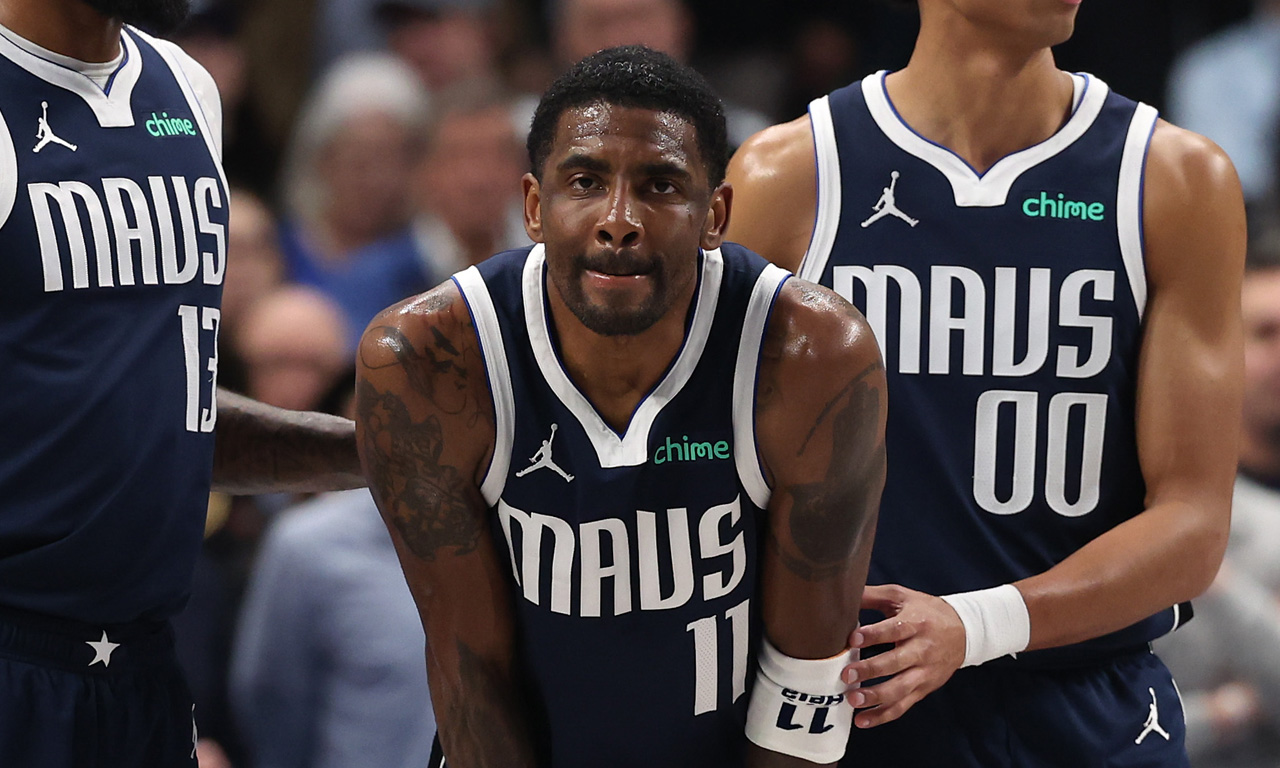
Dallas Mavericks guard Kyrie Irving was injured Monday night and the news dropped on Tuesday that the knee injury is serious — a torn ACL in his left knee that will end his season and a good portion of next season as well.
Brutal. I can’t think of an NBA team that imploded faster than the Dallas Mavericks.
You trade away a 25-year-old phenom who just hoisted you on his back en route to the NBA Finals a year ago. You cashed in that golden ticket to go all-in on a trio of aging stars in Kyrie, Anthony Davis, and Klay Thompson.
Bold strategy, Nico. Let’s see if it pays off.
(Narrator: It’s not paying off.)
The Mavericks had some interesting potential this year and maybe the next couple of years once everyone was healthy, but now? Their star guard is likely out until the calendar year 2026 and Klay and AD aren’t getting any younger nor more durable. The Mavericks may have actually swapped their future for a present that never arrives — and Dallas GM Nico Harrison has to be feeling overwhelming pressure right now.
So how does this impact the Rockets?
For starters, Houston has a game remaining on the schedule against Dallas on March 14th at Toyota Center — Davis may or may not be back for that game.
More importantly, Dallas is the 10th seed in the West at the moment, just 3.5 games ahead of the Phoenix Suns (11th seed). The Rockets control Phoenix’s first-round pick unprotected this season via a swap. We need as many West teams as possible ahead of Phoenix to keep them out of the play-in/playoffs and to push them as deep into the lotto as possible.
This complicates that. Phoenix’s remaining schedule is the toughest in the NBA by a good margin, with plenty of games left against the league’s best teams, so it still looks promising overall — but we’re talking about Kevin Durant, Devin Booker and Bradley Beal. They can still get hot at the right time while Dallas may struggle.
So keep a close eye on that. The good news is the Portland Trail Blazers are one of the hottest teams in the league and they are (shockingly) nipping at the Arizona squad’s heels.
Taking a look ahead to the offseason, the Kevin Durant Pursuit will be big.
This one is a little more complicated for Houston. The Rockets really want Devin Booker but, as of now, the Phoenix plan appears to be to trade KD this offseason and retool around Booker. The Rockets will have interest in Durant but they’re not going to sell the farm (prospects and all the picks) for a 37-year old like they would for Booker.
Three teams that I’ve heard a lot about from Rockets circles that will be in the mix are Houston, Minnesota and Dallas — Timberwolves and Mavericks have been considered the main competition. But, a lot of this will depend on Durant himself and where he wants to play at this stage of his career.
Keep in mind also, if the Suns are “retooling” around Booker and Beal (holding the no-trade clause), then they could be placing a higher priority on win-now players over the return of their own draft assets. The Rockets definitely have the best assets overall to offer up in any trade package between those three teams, but if Phoenix does prefer finding the right ready-to-win players around Booker/Beal, that gives Dallas and Minnesota a real chance.
This injury “may” take Dallas out of the equation, and they are/were definitely a contender for KD’s services given his past relationship with Kyrie and the way Dallas was positioned to win right now. Does KD at his age want to wait for Kyrie to be healthy?
And one last friendly reminder: The Rockets control that Dallas 2029 first (unprotected).
Houston Rockets
Rockets Sign David Roddy to Two-Way Contract
Former first-round pick has played with the Grizzlies, Suns and Hawks
Published
2 months agoon
March 3, 2025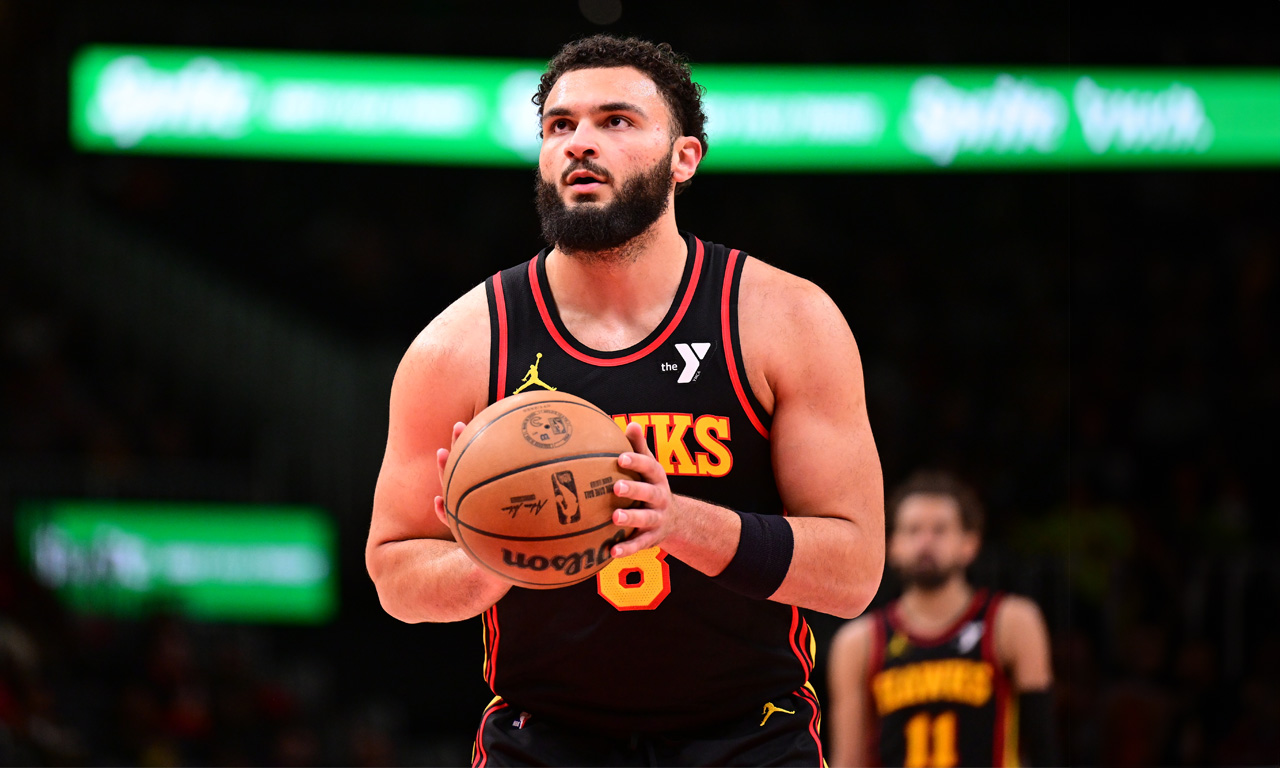
The Rockets made a move on Monday, signing former first-round pick David Roddy to a two-way contract.
The two-way spot opened up after the front office signed Jeenathan Williams to a standard four-year, $8.2 million contract (with friendly team options all along the way).
Roddy is 6-foot-5 and 250+ pounds but sports a 6-foot-11 wingspan. He was taken with the 23rd pick in the first round of the 2022 NBA Draft — six selections after the Rockets drafted Tari Eason. A standout in college, Roddy averaged 19.2 points, 7.5 rebounds, 2.9 assists, 1.2 steals, and 1.1 blocks per game during his junior season at Colorado State.
Roddy, who turns 24 later this month, is a physical player who can play multiple positions. He’s a solid rebounder for his size/position. He has played in 165 games over three seasons with the Grizzlies, Suns, Hawks and most recently Sixers, averaging 6.2 points and 2.9 rebounds per game.
The guard/forward has not shown efficient shooting, however — he’s a career 30.5% three-point shooter and just 68.4% from the line. His defense is better inside than out.
Ultimately, it will be those two things — three-point shooting and defense — that will determine his chances of carving out a consistent role in the league.
All in all, it’s a low-risk signing and the Rockets get a look at a prospect that fits their age timeline.
Houston Rockets
Houston a potential landing spot for Ben Simmons post-buyout?
Published
3 months agoon
February 6, 2025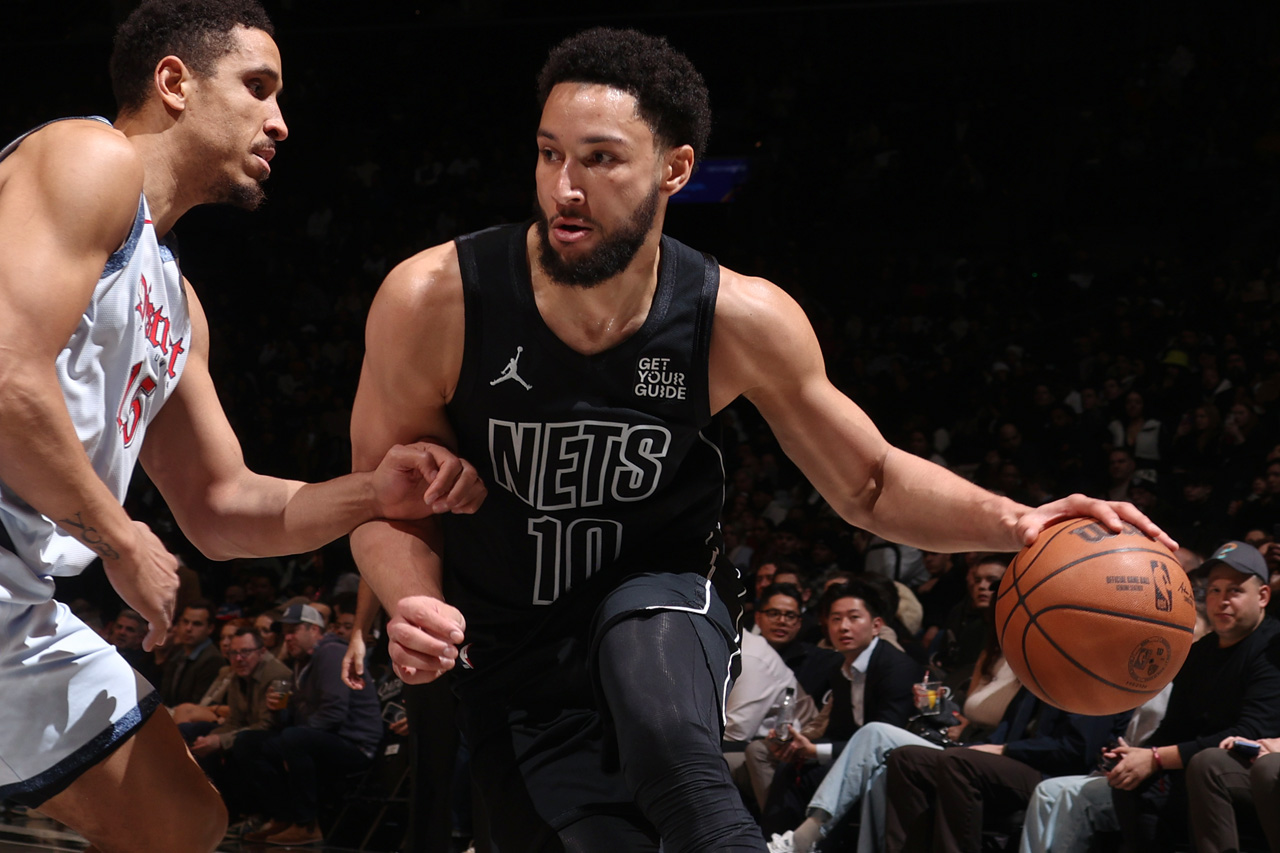
ESPN NBA analyst Brian Windhorst said on Thursday’s NBA Trade Deadline show that Brooklyn Nets forward Ben Simmons is working on a buyout and the Houston Rockets is a potential landing spot for him.
“Cleveland and Houston are two situations for Ben Simmons,” said Windhorst.
Brian Windhorst says the Cavaliers and Rockets are buyout locations for Ben Simmons.
Thoughts? pic.twitter.com/7ly4mvmxr5
— ClutchFans (@clutchfans) February 6, 2025
Advertisement
Rockets coach Ime Udoka was an assistant coach in Philadelphia in 2019-20 when Simmons was with the Sixers, before injuries took a significant toll. In fact, Udoka, when speaking about Amen Thompson earlier this season, brought up some comparisons to Simmons.
“The skill set is there, and it’s something that’s unique with his speed, athleticism, size, passing ability, and all those things,” said Udoka of Thompson. “I coached somebody, Ben Simmons, who had similar traits… as far as size and ability to push the pace, and find guys and finish. There are some similarities there.”
Both Thompson and Simmons are known for their elite athleticism, defensive versatility, and ability to create opportunities in transition.
However, can Simmons help the Rockets today? That’s the tough question.
Simmons has played in 33 games this season, averaging 6.2 points, 6.9 assists, 5.2 rebounds, 0.8 steals and 0.5 blocks in 25 minutes a night. He does not shoot threes (like, at all) — he has only attempted two threes in the past three seasons combined.
Ideally, he does not play in front of your young forwards of Amen, Tari Eason and Jabari Smith Jr. and on that basis alone, I think I would pass. But, Ime loves defensive dogs and he could use some extra ballhandling on the roster. You can see that there’s little in the way of offensive organization when Fred VanVleet is out.
There would be a comical full circle moment though if the Rockets did sign Ben Simmons, considering the Rockets were heavily criticized for trading James Harden in 2021 to Brooklyn instead of to Philadelphia for Simmons. The Rockets clearly made the right choice there.

